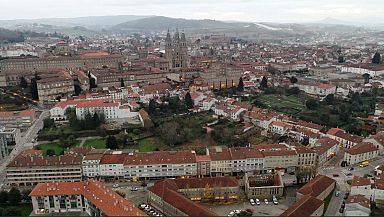A European project is helping to bring new life to degraded land, working to transform and reinvigorate the soil with organic compost and man-made 'technosols'.
Agriculture is an important part of the economic and social fabric of Spain and Portugal. But decades of mining and large-scale farming have left parts of the countryside in poor condition.
Now a European project is helping to bring new life to the degraded landscape, working to transform and reinvigorate the soil with organic compost and man-made "technosols".
It’s part of a joint project called Res2ValHUM involving three Portuguese cities - Braga, Guimarães and Porto - and four in Galicia: Santiago de Compostela, Ourense, Touro and A Coruña.
The project has seven partners in total: two university laboratories and five companies, which specialise in technosols or organic compost production.
The total budget is 2.1 million euros, of which 1.58 million euros is provided by the European Cohesion Policy.
One example of the transformation is at the former Mina de Touro copper mine in Galicia.
Twenty years ago nothing grew there. Now there are trees, reptiles and birds. In this border region, organic waste management is taking root.
Felipe Macías Vázquez, emeritus professor at the University of Santiago de Compostela, told Smart Regions: "It was totally dead. There wasn't a blade of grass. All the grass you see is from ‘technosol’. In this particular case, what we wanted was for there to be activity again: wildlife, to have vegetation again, productive forest. And it was successful."
Researchers at the University of Santiago de Compostela in Spain are studying different types of compost from organic residues including household waste, manure and algae.
They analyse the chemical properties of their components, and their ability to react in different types of soil.
Sarah Fiol López, the project coordinator at the University of Santiago de Compostela, said compost can extract added value.
"For example, the algae that we collect at the beach. It’s just lying there, not being used for anything, and now it has been given a second use.”
The results of the research are shared between all the project partners, such as the Portuguese waste management company Lipor, which receives 60,000 tonnes of "bio-waste" a year.
The waste comes from selective sorting. It is mixed with vegetable waste and the compost is obtained after a few weeks of maturation. They produce 12,000 tonnes of compost per year.
Susana Lopes, an environmental engineer at Lipor, said the facilities make it possible to recover organic matter and return it to the soil.
“It's very, very important to have these kinds of facilities,” she said, adding that compost is an important carbon sink.












